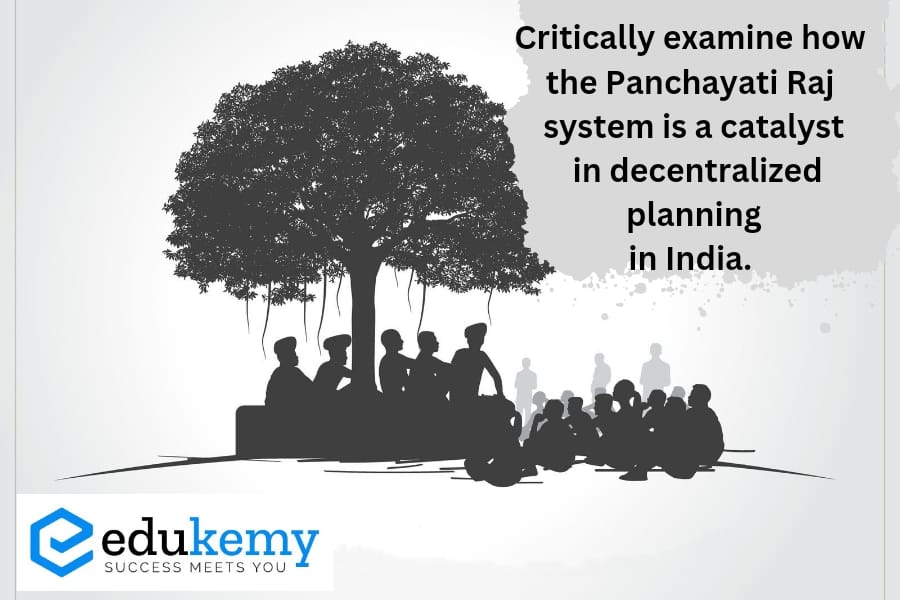
The Panchayati Raj system in India is a decentralized form of government where local self-government institutions called Panchayats govern rural areas.
These institutions are responsible for local governance and development at the grassroots level.
Contents
Decentralized Planning:
Decentralized planning involves the delegation of planning authority and decision-making power to lower levels of government, allowing for tailored development strategies that address local needs and priorities.
How Panchayati Raj System Catalyzes Decentralized Planning in India:
- Local Participation: Panchayats facilitate direct participation of local communities in decision-making processes, ensuring that development plans are reflective of their needs and aspirations.
- For example, in Kerala, the People’s Planning Campaign involved extensive consultations with local communities to formulate decentralized plans.
- Tailored Development: Panchayats possess intimate knowledge of local conditions, enabling them to formulate development plans that are specific to the socio-economic and environmental context of their respective areas.
- For instance, Panchayats in Rajasthan have developed water management plans suited to local geography and water availability.
- Resource Allocation: Panchayats have the authority to allocate resources according to local priorities, leading to more efficient utilization of funds and resources.
- In West Bengal, the Gram Panchayats allocate funds for various development schemes based on local needs.
- Capacity Building: Panchayats play a crucial role in building the capacity of local leaders and officials, enabling them to effectively plan, implement, and monitor development activities.
- Training programs conducted by institutions like the National Institute of Rural Development and Panchayati Raj (NIRDPR) help enhance the skills of Panchayat members in areas such as financial management and project execution.
- Empowerment of Marginalized Groups: Panchayats provide a platform for the participation of marginalized groups such as women, scheduled castes, and tribes in decision-making processes, thereby empowering them and addressing their specific needs in development planning.
- In Rajasthan, the reservation of seats for women in Panchayats has resulted in the implementation of projects catering to women’s welfare, such as the construction of community toilets and provision of maternal healthcare services.
- Innovative Solutions: Panchayats encourage innovation and experimentation in addressing local challenges, leading to the development of context-specific solutions.
- For example, some Panchayats in Himachal Pradesh have implemented eco-friendly waste management initiatives tailored to local conditions.
Problems in Panchayati Raj System:
- Limited Financial Autonomy: Panchayats often rely heavily on funds allocated by higher levels of government, limiting their financial autonomy and ability to implement development projects effectively.
- Political Interference: Political interference at the local level can undermine the autonomy of Panchayats and influence decision-making processes, affecting the effectiveness of decentralized planning.
- Capacity Constraints: Panchayats may lack the necessary human and institutional capacity to formulate and implement development plans effectively, particularly in remote and underdeveloped areas.
- Inequality among Panchayats: Disparities in resources and capacities among Panchayats can result in uneven development outcomes, perpetuating inequalities within and between regions.
- Administrative Bottlenecks: Complex bureaucratic procedures and administrative hurdles may hinder the efficient functioning of Panchayats and delay the implementation of development projects.
To strengthen the Panchayati Raj system and enhance its role as a catalyst in decentralized planning, it is imperative to address these challenges. This can be achieved through measures such as increasing financial autonomy, strengthening capacity building initiatives, reducing political interference, and promoting inclusive and participatory governance.
Conclusions:
By overcoming these obstacles, Panchayats can play a pivotal role in fostering grassroots democracy and promoting sustainable and inclusive development in India.
In case you still have your doubts, contact us on 9811333901.
For UPSC Prelims Resources, Click here
For Daily Updates and Study Material:
Join our Telegram Channel – Edukemy for IAS
- 1. Learn through Videos – here
- 2. Be Exam Ready by Practicing Daily MCQs – here
- 3. Daily Newsletter – Get all your Current Affairs Covered – here
- 4. Mains Answer Writing Practice – here

